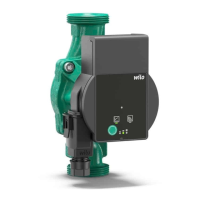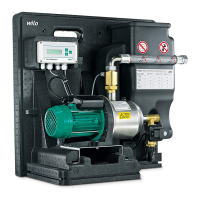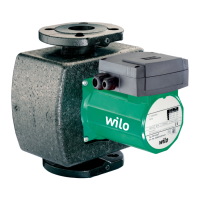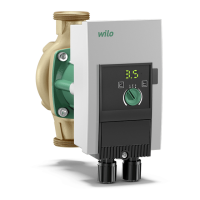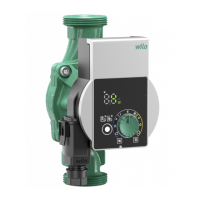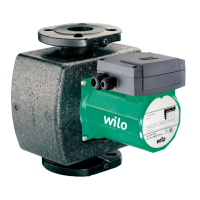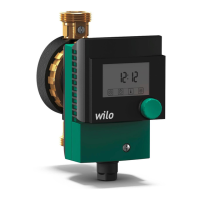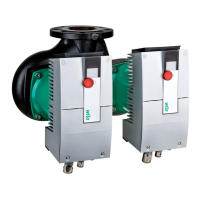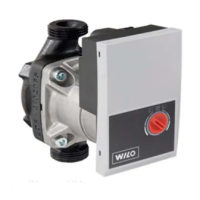Do you have a question about the Wilo Atmos GIGA-N and is the answer not in the manual?
Instructions are integral to the device; read and keep accessible for correct operation.
Content is copyrighted; reproduction or distribution requires manufacturer permission.
Manufacturer reserves the right to make technical modifications without prior notice.
Details how safety instructions are presented with signal words, symbols, and shading.
Outlines necessary qualifications for personnel performing installation and maintenance tasks.
Specifies requirements and precautions for performing electrical work on the device.
Provides safety instructions for transporting the pump, including protective equipment guidelines.
Details safety precautions for installation and dismantling, including necessary protective equipment.
Lists essential safety rules and precautions to follow during the pump's operation.
Outlines safety rules and precautions to be observed when performing maintenance tasks.
Mentions the use of IEC standard motors and refers to technical data for motor selection.
Defines the duties and responsibilities of the pump operator for safe and correct operation.
Specifies the intended applications for the Wilo-Atmos GIGA-N pumps in building services.
Warns against misuse of the pump and lists potential dangers and consequences of incorrect usage.
Describes the physical construction and components of the Wilo-Atmos GIGA-N pump.
Explains the possibility and requirements for operating the pump with a frequency converter for optimization.
Lists key technical specifications, parameters, and ratings of the pump.
Explains the meaning of the different codes and characters in the pump's type designation for identification.
Details what components are included in the complete pump unit package.
Mentions available accessories for the pump and where to find detailed information.
Provides information on the sound pressure levels generated by the pump at various operating conditions.
Provides data on the maximum forces and torques that can be applied to the pump flanges.
Explains the pump delivery process and the procedure for checking for damage upon receipt.
Details safety precautions, guidelines for transporting the pump, including lifting and attaching the pump/unit.
Provides requirements and procedures for storing the pump correctly to prevent damage.
Specifies that electrical work must be performed by a qualified electrician.
Outlines operator duties for safety, regulatory compliance, and installation documentation checks.
Details essential checks and preparations required before commencing the pump installation.
Guides on selecting the motor and coupling when installing the pump as a standalone unit.
Covers requirements for installing the pump unit on a foundation, including base preparation and alignment.
Provides instructions and warnings for properly connecting the pump to the piping system.
Explains the importance and process of aligning the pump and motor unit, including coupling checks.
Details safety precautions, procedures, and components for making the electrical connection to the pump.
Specifies electrical qualifications and operational instruction requirements for personnel.
Explains the step-by-step process for filling and venting the pump and associated system.
Details how to check and correct the motor's direction of rotation for proper pump operation.
Provides essential steps and precautions for safely starting up the pump.
Addresses considerations for switching frequency and its impact on motor operation.
Explains how to switch off the pump for temporary periods and related safety precautions.
Covers procedures for shutting down the pump for extended periods or storage, including frost protection.
States requirements for qualified electricians and technicians with mechanical knowledge for maintenance.
Guides on monitoring pump operation, identifying issues, and checking components for wear or leaks.
Lists recommended periodic maintenance checks and tasks to ensure optimal pump performance.
Provides instructions for draining and cleaning the pump as part of maintenance procedures.
Outlines the steps for dismantling the pump, including components like the slide-in unit and bearing bracket.
Guides on reassembling and installing components, including shaft, bearing bracket, slide-in unit, and screw torques.
Lists possible error types that may be encountered during pump operation.
Provides a table matching identified faults with their causes and recommended corrective remedies.
Lists all available spare parts with their item numbers, descriptions, and quantities.
Provides guidelines for the proper collection and disposal of oils and lubricants used with the pump.
Specifies procedures for disposing of water-glycol mixtures in compliance with environmental regulations.
States that used protective clothing must be disposed of according to local environmental regulations.
Advises on the proper disposal of electrical and electronic products to prevent environmental harm.
| Brand | Wilo |
|---|---|
| Model | Atmos GIGA-N |
| Category | Water Pump |
| Language | English |
